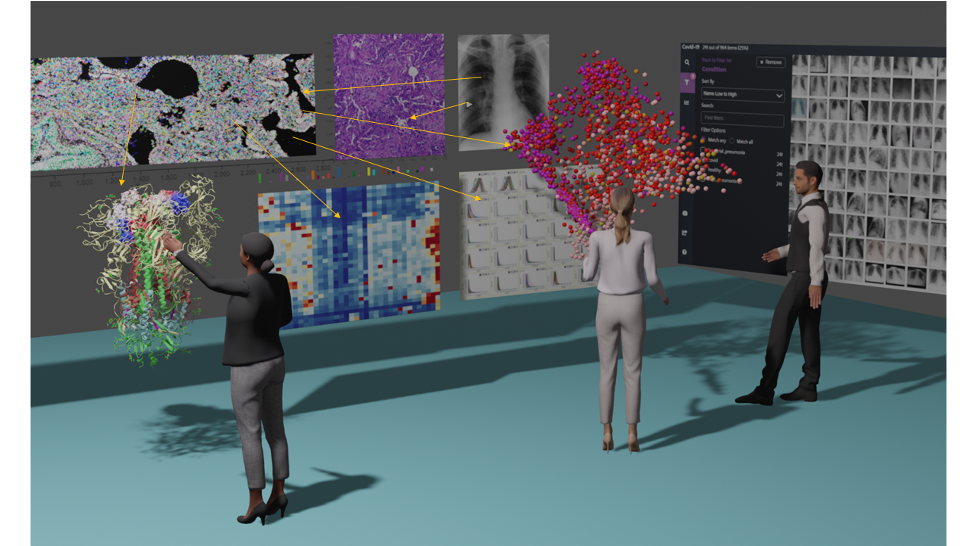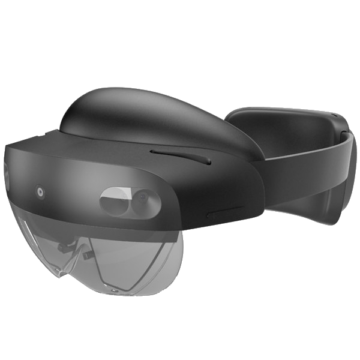
Thank you very much for your interest in our research! I’m Yuko Suzuki, a PhD candidate at the Institute of Educational Technology, The Open University, and the principal investigator of the project. This is a collaboration project with the Wellcome Trust Centre for Human Genetics, University of Oxford.
Can Spatial Computing and Mixed Reality Make Data Analysis More Efficient?
With the release of the Meta Quest 3 and as the Apple Vision Pro headset emerges in 2024, Mixed Reality (MR) may revolutionise the way we analyse and visualise complex biological data. However, the immersive nature of MR also presents challenges, including potential cognitive overload from vast amounts of data displayed on the extended screen space.
We invite you to play a role in shaping the future of data analysis through MR technology. Please participate in our 45-minute study and help us identify the ideal design principles and layouts for data analysis tools to optimise cognitive performance and enhance biological research outcomes. The aim is to do the study over January and February 2024.
If you are interested, please email yuko.suzuki@open.ac.uk and we will send out further details.
For anyone completing the study session, there will be a £20 Amazon voucher as a thank you for your time!
Research Study Participant Information
This study is entitled “Can Spatial Computing and Mixed Reality Make Data Analysis More Efficient?” We use Mixed Reality Headset called Microsoft HoloLens 2 for this study and you will be asked to perform some simple data analysis tasks in MR space. It is quite fun to try out the state-of-art MR device that could be a norm to your future working environment!

How do I take part?
Please just email me at yuko.suzuki@open.ac.uk with your preferred time and date (one session will take 40-50min, but please allow a bit more just in case!). Available slots are from 9am to 12pm on from Tuesday to Friday (or weekends if you would like!) in February 2024.
Contact details
Researcher: Yuko Suzuki
Email: yuko.suzuki@open.ac.uk
Alternative Contact (Supervisor): Prof. Fridolin Wild
Email: f.wild@open.ac.uk
Collaborator Contract (Oxford University): Prof. Stephen Taylor
Email: stephen.taylor@well.ox.ac.uk
Research ethics
This research project has been reviewed by, and received a favourable opinion, from The Open University Human Research Ethics Committee – HREC reference number: 2023-0100-2.
What does this involve?
The study involves wearing a head-mounted display device Microsoft HoloLens2, performing data analysis tasks, having the eye-tracking data taken with the non-invasive system and completing a survey questionnaire.
It will take about 45 minutes in total to complete the session in a room. A researcher will be in the room with you and assist you throughout the experiment.
Who can participate?
We are looking for students and researcher in the field of bioscience or anything close to it. You just need to have a basic understanding of visual inspection of data analysis. Well, if you know what box plots are, you are in!
Because the experiment involves seeing real and virtual objects through HoloLens2, people with visual impairment are discouraged to participate although regular glasses and contact lenses can be worn under the device.
Participants must be over eighteen years of age, and they should not have Covid-19 to attend the experiment. Clinically extremely vulnerable people at higher risk from Covid-19 are also discouraged to participate because it will be run in a room where a researcher will guide through the procedure.
What will I be asked to do if I agree to take part?
It is up to you to decide whether or not to take part. If you do decide to take part, you will be given this information sheet to keep and be asked to sign a consent form. Although there is no recompense offered for the participation, you get to try out state-of-art AR device and to know your spatial visualisation test score if you wish to. There is no foreseen disadvantages and risks of taking part as all the procedure will be done in safe manner using a non-invasive measuring system.
In a bigger picture, developing cognitively efficient science learning tools will help people from different backgrounds engage in STEM subject and keep pace with the accelerated scientific and technological advancement of today.
How will the data I provide be used?
The data you provide includes the spatial visualisation test performance data, eye-tracking data and some basic demographic information such as your age and gender as well as experience with HoloLens2 and STEM subjects.
Your data will be stored on a password protected computer and server until the end of project completion on 31st March 2026. As soon as the data is anonymised and the analysis is complete, any data associated with the personal information will be destroyed.
Information will be used for academic reports, theses, publications, websites and social media relevant to the research. The information will be fully anonymised before being shared in any form. Once the study is consolidated in a written form, you will receive the copy of the findings.
Eye-tracking data taken during the study will be deposited in a specialist data centre after it has been anonymised, so it can be used for future research and learning. The eye-tracking data consists of position data of where your eyes are looking at and no biometric information associated to your identity will be taken.
How can I withdraw from the study?
You have the right to withdraw from the study at any time during your participation by contacting the researcher by email (yuko.suzuki@open.ac.uk) or in person during the experiment. You also have the right to ask for your data to be removed after your participation in the study by contacting the researcher by email up until the time all data have been aggregated for analysis at end of December 2022.
Thank you
Thank you very much for taking time to read the information sheet. If you have any further questions or concerns, please don’t hesitate to contact the researcher.
Data Protection
The Open University is the Data Controller for the personal data that you provide.
The lawful reason for processing your data will be that conducting academic research is part of The Open University’s public task. The consent we request from you relates to ethical considerations.
You have a number of rights as a data subject:
- To request a copy of the personal data we have about you
- To rectify any personal data which is inaccurate or incomplete
- To restrict the processing of your data
- To receive a copy of your data in an easily transferrable format (if relevant)
- To erase your data
- To object to us processing your data
If you are concerned about the way we have processed your personal information, you can contact the Information Commissioner’s Office (ICO). Please visit the ICO’s website for further details.